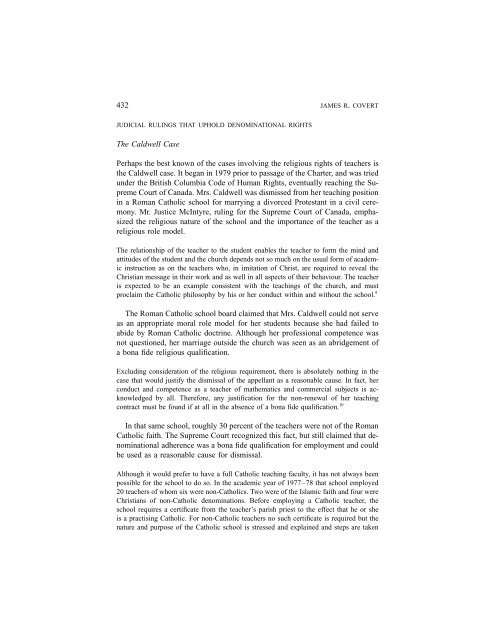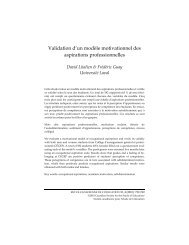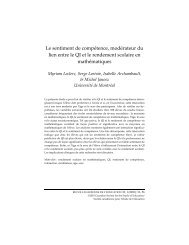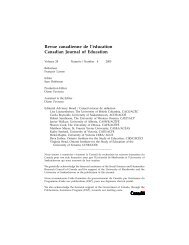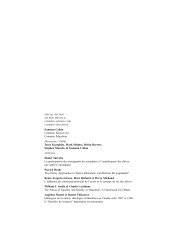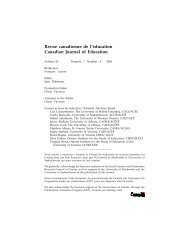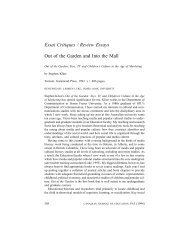Mireille Falardeau et Michel Loranger Le choix de stratégies ... - CSSE
Mireille Falardeau et Michel Loranger Le choix de stratégies ... - CSSE
Mireille Falardeau et Michel Loranger Le choix de stratégies ... - CSSE
Create successful ePaper yourself
Turn your PDF publications into a flip-book with our unique Google optimized e-Paper software.
432 JAMES R. COVERT<br />
JUDICIAL RULINGS THAT UPHOLD DENOMINATIONAL RIGHTS<br />
The Caldwell Case<br />
Perhaps the best known of the cases involving the religious rights of teachers is<br />
the Caldwell case. It began in 1979 prior to passage of the Charter, and was tried<br />
un<strong>de</strong>r the British Columbia Co<strong>de</strong> of Human Rights, eventually reaching the Supreme<br />
Court of Canada. Mrs. Caldwell was dismissed from her teaching position<br />
in a Roman Catholic school for marrying a divorced Protestant in a civil ceremony.<br />
Mr. Justice McIntyre, ruling for the Supreme Court of Canada, emphasized<br />
the religious nature of the school and the importance of the teacher as a<br />
religious role mo<strong>de</strong>l.<br />
The relationship of the teacher to the stu<strong>de</strong>nt enables the teacher to form the mind and<br />
attitu<strong>de</strong>s of the stu<strong>de</strong>nt and the church <strong>de</strong>pends not so much on the usual form of aca<strong>de</strong>mic<br />
instruction as on the teachers who, in imitation of Christ, are required to reveal the<br />
Christian message in their work and as well in all aspects of their behaviour. The teacher<br />
is expected to be an example consistent with the teachings of the church, and must<br />
proclaim the Catholic philosophy by his or her conduct within and without the school. 9<br />
The Roman Catholic school board claimed that Mrs. Caldwell could not serve<br />
as an appropriate moral role mo<strong>de</strong>l for her stu<strong>de</strong>nts because she had failed to<br />
abi<strong>de</strong> by Roman Catholic doctrine. Although her professional comp<strong>et</strong>ence was<br />
not questioned, her marriage outsi<strong>de</strong> the church was seen as an abridgement of<br />
a bona fi<strong>de</strong> religious qualification.<br />
Excluding consi<strong>de</strong>ration of the religious requirement, there is absolutely nothing in the<br />
case that would justify the dismissal of the appellant as a reasonable cause. In fact, her<br />
conduct and comp<strong>et</strong>ence as a teacher of mathematics and commercial subjects is acknowledged<br />
by all. Therefore, any justification for the non-renewal of her teaching<br />
contract must be found if at all in the absence of a bona fi<strong>de</strong> qualification. 10<br />
In that same school, roughly 30 percent of the teachers were not of the Roman<br />
Catholic faith. The Supreme Court recognized this fact, but still claimed that <strong>de</strong>nominational<br />
adherence was a bona fi<strong>de</strong> qualification for employment and could<br />
be used as a reasonable cause for dismissal.<br />
Although it would prefer to have a full Catholic teaching faculty, it has not always been<br />
possible for the school to do so. In the aca<strong>de</strong>mic year of 1977–78 that school employed<br />
20 teachers of whom six were non-Catholics. Two were of the Islamic faith and four were<br />
Christians of non-Catholic <strong>de</strong>nominations. Before employing a Catholic teacher, the<br />
school requires a certificate from the teacher’s parish priest to the effect that he or she<br />
is a practising Catholic. For non-Catholic teachers no such certificate is required but the<br />
nature and purpose of the Catholic school is stressed and explained and steps are taken


